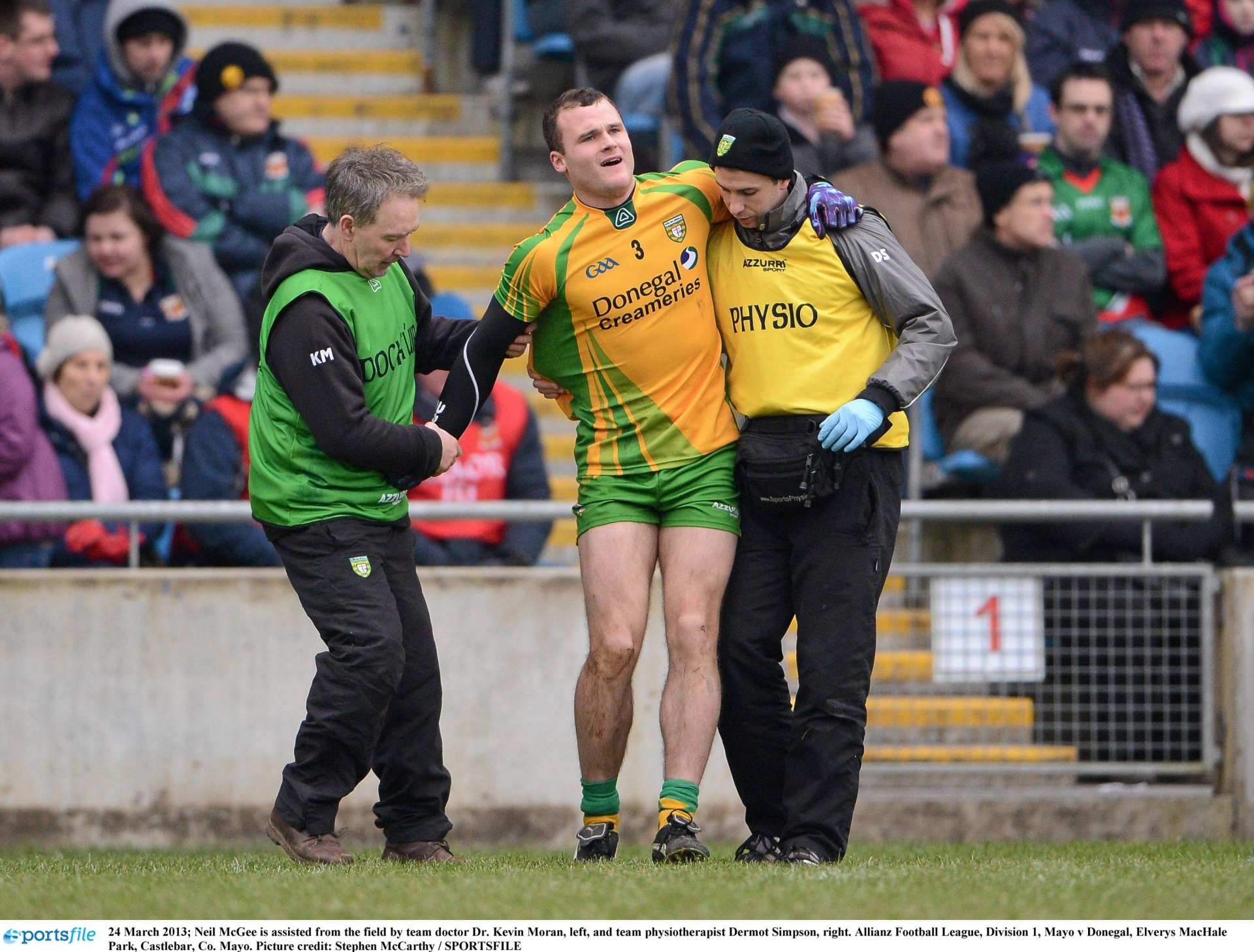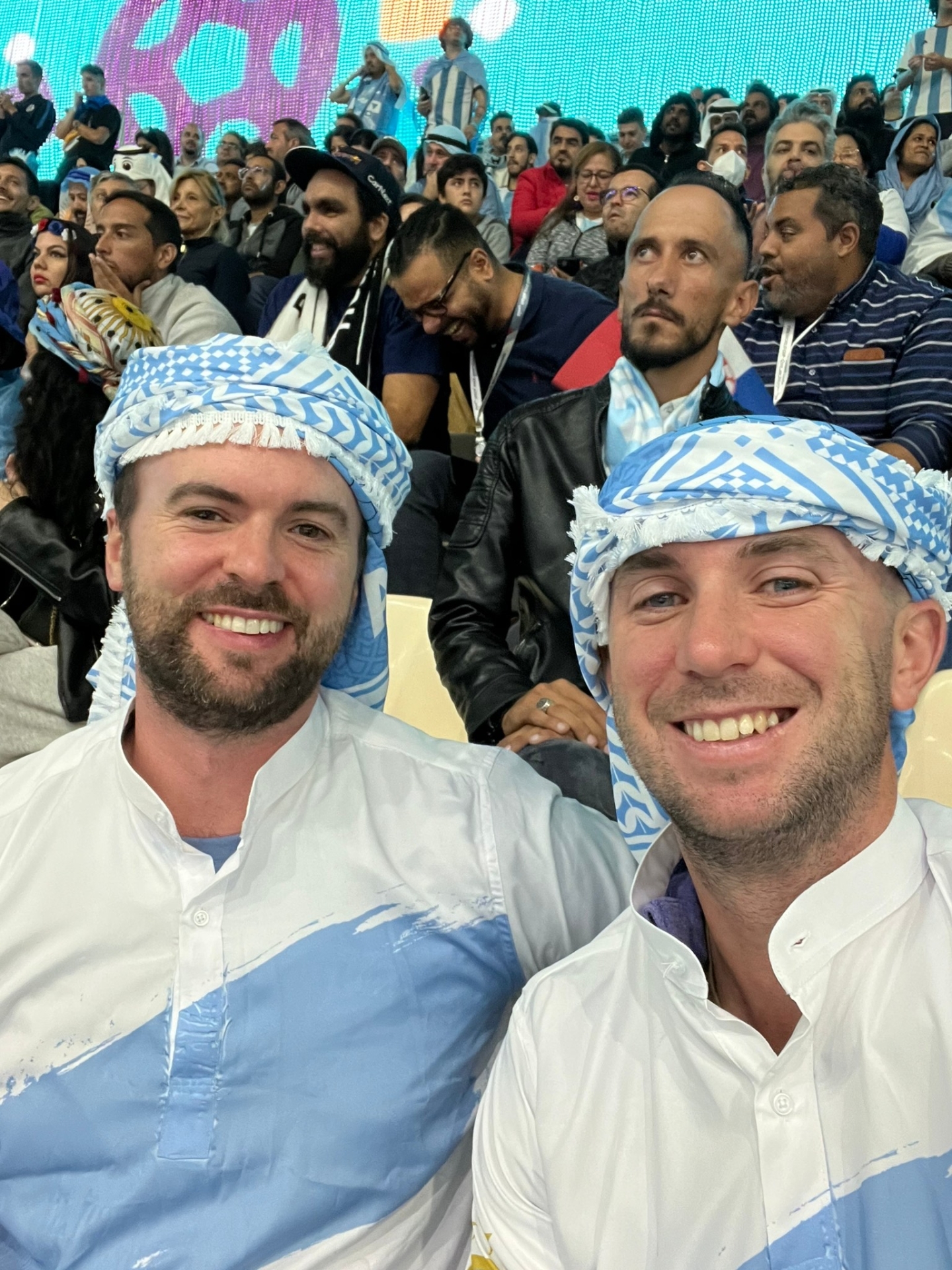
Dermot Simpson and his partner Yuliya at the opening match of the 2022 World Cup where hosts Qatar played Senegal.
Donegal’s 2012 All-Ireland winning physio Dermot Simpson is now based at the world-renowned Aspetar sports medicine clinic in Doha, Qatar.
With the World Cup reaching a dramatic climax on Sunday night with Argentina defeating France 4-2 on penalties following a 3-3 draw after extra-time, the Carndonagh native was in attendance at the Lusail Stadium and shared his experience from both home and away.
Frank Craig: You came in with Donegal at a brilliant time, what was that experience like, helping a group of players achieve and win an All-Ireland title?
Dermot Simpson: I came on board with Donegal in February of 2012. The NFL had already started. The first game I was involved in, with the set-up, was Cork. Michael Murphy scored an amazing goal very early on that day, just seconds in. We stayed up that year. But that’s when it all really started. I was only 24 years old. It was a brilliant opportunity - especially the way it went for Donegal. It was just a crazy year. Under Jim McGuinness and Rory Gallagher. It was just at a different level.
Even though I hadn’t worked with many teams at that stage, you just sensed right away that something was building there. The intensity of the training, the commitment of the entire squad, they were on a real mission.
I ended up staying on for four seasons, right up until 2015. We lost an Ulster final and Mayo eventually accounted for us in the last eight in the All-Ireland.
FC: The move to Qatar and the Aspetar Clinic, how far removed all of that from the work you’d previously been doing at home?
DS: At first, the plan was to just come out here for a few years. Aspetar is a government owned sports hospital. They specialise in sports science, sports research and sports physiotherapy. They were doing some really interesting things at the time.

I just thought it would be a nice opportunity to go away for a little while. I always planned to do that at some stage. But I definitely didn’t expect to be here as long as I have. The working conditions are great, the holidays are good and the hours aren’t crazy.
I finish up at 4pm every day and I have the weekends off. I wanted a change from the way I was working at home and this was it. There is a life to work balance. Just being able to work off your own schedule was so different to what I’d been used to.
With Donegal, in that four-year spell, I only missed one training session. There was always an important match coming up and there were always players that needed to get back. You were missing out on things like holidays, weddings and so on.
At the time, I loved it, I was all in. But I think the life span of being involved in something like that is probably around four years. Physically and mentally I was ready for a chance - more clinic work.
Clinic and teamwork are two very different things. Team is getting the guy ready for the next match. Here, in the clinic, it’s often long term injuries where you’re spending much more time with the athlete. I might see some people here four to five times a week. You’re dealing with professional athletes. And by that I mean they don’t have anywhere else they need to be. With Donegal, you were seeing people after work. You were at training for five hours but you had 35 players to see about.
So your time is quite limited unless you see them outside of training. But those guys were all amateur athletes, they all had jobs to go to. So again, you had to work around their schedule.
But that’s why I’ve so much administration and respect for the GAA lads. They are the most professional amateur athletes I’ve ever seen. Their workrate and physical abilities are just as good as the full time professionals I see here. But they get to that level with so much else going on in their lives.
FC: What’s the crucial difference now between what top intercounty players are doing and individuals in other professional team sports?
DS: Working with football sides here, you realise right away they have loads of time on their hands. They can really periodise what needs to be done. You can call them in, any time you want. These teams have access to their players seven days a week.
If extra work needs to be done or even if there are players that need to just deload a little, all that is easily enough structured. With intercounty players, you have three or four days to get that work done.
You might not get out of Convoy until after midnight after training. Some players would be the same. They’d be going back to the likes of Dublin. They’d be getting to bed at 3.30am and rising again at 7am. And this would be after running 9 or 10k in a session.
That builds up and accumulates over time. But then again, that worked really well for us in 2012. Without that intensity we wouldn’t have won the All-Ireland. But it was also a really potent amalgamation of a few things.
The team environment that the management helped build, that effort on the training field, everyone just bought into it. At that time, those players were leaving Convoy or MacCumhaill Park knowing no other side in the country was training as hard.
Even with hindsight, I believe it was worth it. But at the same time it’s tough on the players, especially year after year. Mentally and physically, it’s a hard level to maintain.
FC: Outside of that bubble now, the GAA one I mean, and seven years down the track, you’re probably as well placed as anyone to look at or comment on the intensity of that commitment.

Brothers Jerry and Dermot Simpson from Carndonagh watching Argentina on their way to winning the World Cup
DS: The training minutes to game time back then, it was crazy. There was a match every other four weeks. So that was working out at 10 to 12 training sessions to one game. But if players are playing games, they’ll stay fit.
I think there was something like seven weeks between the last league game in 2012 and the first round of the championship. That’s way too long. It’s basically two pre-seasons. There is a pre-season before the league, and that’s tough. The league, to be fair, was more or less week on week.
But then you were into another seven weeks off, before the championship started. It was good if you were looking for injuries to clear up. And people say we didn’t get any injuries in 2012, we did. But they mostly occurred in between the matches.
FC: Looking at various players’ social media in the lead in to and during this World Cup, Aspetar and yourself have featured frequently. What exactly do you do there?
DS: You get used to it - seeing all these top level guys come through the door. But at the start, it did kinda take a little getting used to. At the minute, we have the main area of the clinic closed specially for World Cup teams. I was treating a World Cup player last week.
For confidentiality reasons, I can’t say who. But we’ve had some high-profile guys in. France’s Karim Benzema has been in, that’s been on the news a good bit anyways. He was ruled out after having an MRI on his quad. Even before the World Cup, we’d have the likes of the PSG guys over quite a bit for treatment. Presnel Kimpembe was here for about a week. Again, it’s okay to say as he had his social media guy with him and was quite candid with everything he posted online.
He came originally with a hamstring injury but it was actually an Achilles injury that would eventually rule him out of the tournament. But they are really pushing it here. In terms of technology, we have a state-of-the-art assessment centre. And when you see players get back in very good time you know that what’s being done here works.
We use things like force plates for jumping data. They show any imbalance between the left and right sides. They show biometrics and reactive strengths and if one side is compensating more than the other.
Recently, I’ve been doing alot of 3D biomechanics, looking at how the athlete is moving in sprinting and in their change of direction. Are they tilting more towards one side or off loading more towards one side?
The data will basically show if that person is confident in their knee, ankle or whatever, post surgery. We look at a lot of ACL injuries and because there is so much data being collected, it will be really beneficial moving forward. It’s exciting work and it’s evolved so much.
Subscribe or register today to discover more from DonegalLive.ie
Buy the e-paper of the Donegal Democrat, Donegal People's Press, Donegal Post and Inish Times here for instant access to Donegal's premier news titles.
Keep up with the latest news from Donegal with our daily newsletter featuring the most important stories of the day delivered to your inbox every evening at 5pm.